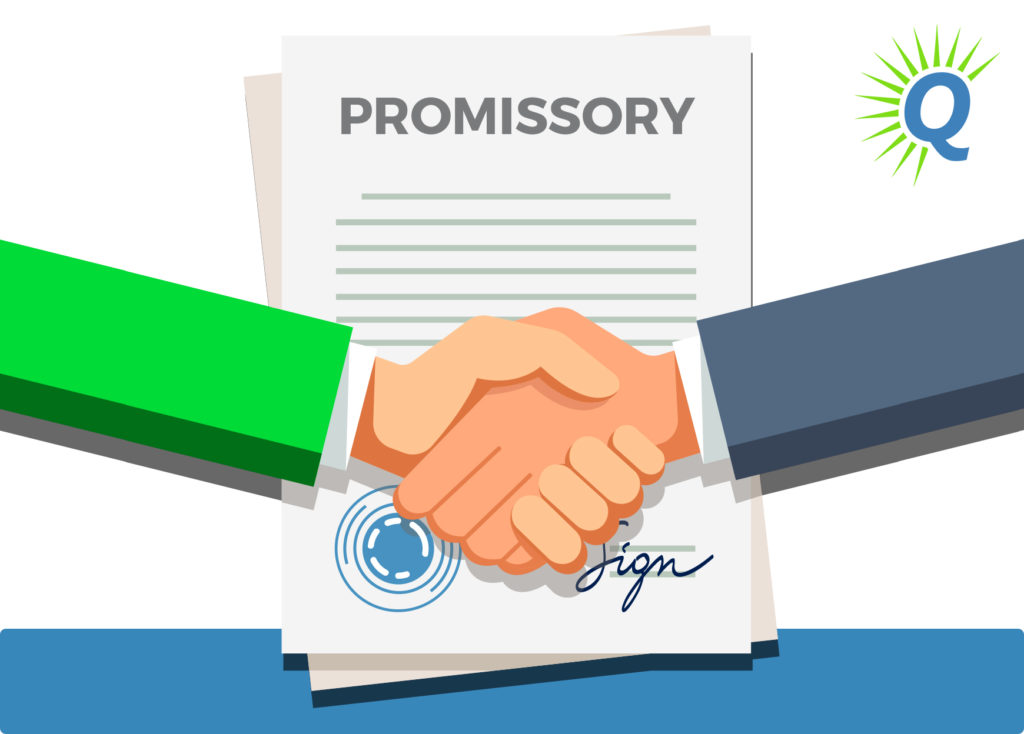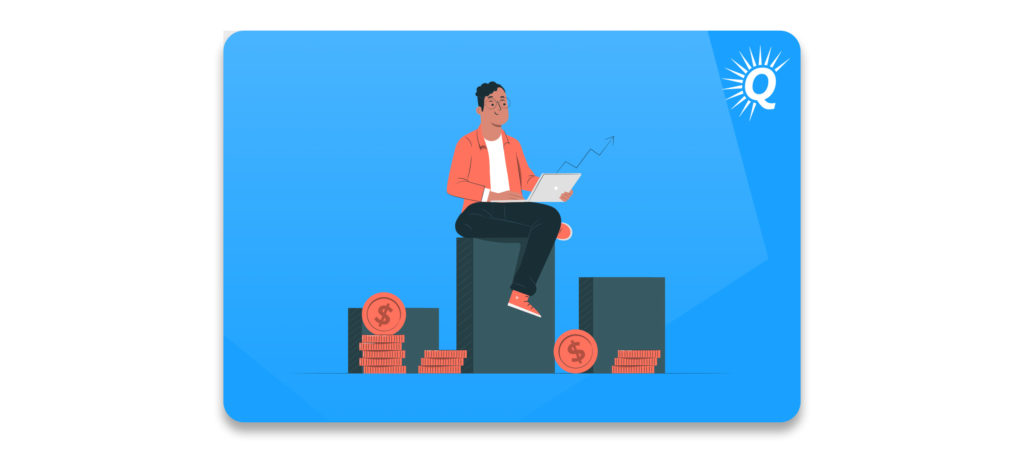Topics:
Never Miss a Beat - Get Updates Direct to Your Inbox
FILTER:


The Role of Promissory Notes in Business Acquisitions
By Quiet Light
In deals that involve financing terms, promissory notes play an essential role. Regardless of whether you’re a buyer or seller, it’s important to understand how to use promissory notes when structuring a deal.


In this article, we share everything you need to know about promissory notes in business transactions.
What is a Promissory Note?
The sum of money gets paid on demand or at a specific future date, or dates. The person who promises to pay the money issues the note. The person or party who is receiving the money is the payee.
In short, a promissory note is a written promise that one party will pay another party per the terms of the note. Promissory notes are legally binding agreements, creating a legal obligation between both parties.
It is worth mentioning that a promissory note is similar in purpose to a loan agreement, also called a loan contract. However, a loan agreement is usually a more detailed and complex document compared to a promissory note, requiring more legal consideration during the drafting process. Likewise, the legal ramifications differ from promissory notes.
When seller financing is involved, promissory notes are critical.
Seller Financing
In a seller-financed deal, the buyer makes a down payment on the business. The buyer then pays the remainder of the balance to the seller over time.
For the buyer, seller financing can be a wonderful option. It allows you to purchase an income-generating business with minimal upfront investment. Over time, you can pay off the remaining balance with the income that you derive from the business.


However, this deal structure represents a risk for the one selling the business. In a seller-financed transaction, the seller needs to have confidence that the buyer will pay the balance. This is where promissory notes come into play.
Who Uses Promissory Notes?
Promissory notes involve two people or parties when making a loan to another. As such, there are many different situations when one might use one. These situations include:
- Federal student loan
- Car loan
- Personal loan
- Home loan
- Loan between friends or family
- Business loan
- Mortgage loan


As we have discussed, one method of financing the sale of a business is through seller financing. In this scenario, the person buying the business will issue a promissory note. In it, they should include the terms of future payments to the person selling the business. The seller becomes the lender, and the buyer becomes the borrower.
Promissory Note Contents
While the concept of a promissory note is relatively straightforward, it is essential that you draft the note responsibly. After all, a lot is at stake. As the owner, if you choose to engage in seller financing, you want to be as sure as possible that you will recover the cost of your loan. The promissory note is the instrument for ensuring that your agreement with the borrower is clearly spelled out.
A well-written promissory note should cover all of the details and terms of the seller-financed loan. These commonly include the following:
- Names of both parties involved
- Addresses of both parties involved
- Principal amount
- Collateral used in order to secure the loan, if any
- Repayment schedule
- Interest rate
- Signatures of both parties
Many of these details are self-explanatory. Below, we will briefly discuss several of these points.
Principle Amount
Even with seller financing, it is common for the buyer to put down some portion of the total agreed-upon sale price in the form of a down payment. They may come up with this cash from their own assets, through an SBA loan, or from investors. However, that still leaves a significant portion of the sale price covered by seller financing.


The promissory note must include a clear and specific dollar amount that the buyer will pay the seller at some point in the future.
Collateral
One of the reasons that seller financing can be so attractive to potential buyers is that it does not require them to already have a ton of wealth to purchase a successful business. From the seller’s point of view, however, one of the biggest areas of concern with a seller-financed deal structure is ensuring that you actually receive the money promised in the agreement.
One way to instill confidence in the deal is to use collateral. Collateral is something of value that is provided as security for the loan. In this situation, the buyer would list something of their own that has value. If the buyer fails to uphold their payment agreement, the seller would then be legally allowed to take possession of the agreed-upon collateral.
When collateral is involved, the document is called a secured promissory note. When collateral is not involved, it is called an unsecured promissory note.
For example, let’s say that an individual is interested in purchasing a business but they don’t have any capital to invest beyond the down payment. However, they do have ownership of a very expensive classic, Aston Martin.
The buyer and seller would agree on specific payment terms. As part of the deal, the buyer would also agree that if they fail to fulfill the payment terms, the seller will take ownership of their Aston Martin.


From the seller’s point of view, collateral helps to ensure that they will recover at least some value even if the deal goes south. In addition, it incentivizes the buyer to ensure that the business continues to perform well after the purchase to fulfill their debt obligations; a classic Aston Martin would be a pity to lose in a business deal.
Payment Schedule
In addition to the total amount to be paid and any collateral agreements, it is imperative to clearly list the agreed-upon payment schedule. This is also referred to as the loan term. For some agreements, the remaining balance may be due at one specific date in the future. More commonly, there may be multiple payments at regular intervals.
Either way, it is important to clearly list the payment dates. In addition, the promissory note should clearly state the amounts to be paid on those dates. Keeping things clear and removing ambiguity is crucial to ensure a smooth process.
Interest Rate
Borrowed money is rarely free. This applies when it comes to seller financing as well. Often, a seller-financed deal will involve some form of interest on the loaned amount. The interest rate amount and terms should be clearly spelled out in the text of the promissory note.
In addition to these items included on a promissory note, you may want to consider getting the promissory note notarized by an official notary. Getting it notarized adds another layer of legal protection for both parties and increases the legal weight of the note should issues arise.
Legal Standing and Enforcement
Most often, business transactions go smoothly when approached responsibly. You can work to create a peaceful transition by carefully choosing who you will buy from or sell to, focusing on building solid relationships, and clearly setting out the terms of the deal.


However, issues can arise. With owner financing, the worst-case scenario for the seller is that the buyer stops making the agreed-upon payments. When this happens, it is important to know what options are available to collect on the debt.
Written Notices
The easiest option available for the seller is to provide the buyer with written reminders of their obligation to pay back the loan according to the agreed-upon schedule. Often, this is all that is needed to prompt the buyer to resume payments.
If the business has run into trouble and income has decreased, the buyer may have issues maintaining the same payment schedule. In this situation, the seller can decide if they want to accept a late payment, renegotiate the payment schedule, or strive to enforce the terms of the original note.
Debt Collector
If the seller persistently has trouble collecting the remaining loan amount, they have the option to work with a debt collector to collect the debt. A debt collector is a professional individual or agency that collects debts on behalf of others, whether it is a personal loan, delinquent bills, or another form of debt. In this scenario, the debt collector will do the work to collect the debt in exchange for a percentage of the balance.
Buy a Profitable Online Business
Outsmart the startup game and check out our listings. You can request a summary on any business without any further obligation.
In addition, the seller could potentially sell the promissory note, and thus, the remaining debt, to the debt collector. Obviously, in this situation, they would receive less than they would under the original terms of the note.
Lawsuit
If all else fails, the seller has every right to file a lawsuit to collect the remaining debt. With a clearly written promissory note in hand, the seller will have a powerful case in court.
However, lawsuits are costly in time, money, and energy. When deciding to go down this route, it is important to weigh the costs with the potential benefits. It is preferable if the dispute can be satisfactorily handled without a lawsuit. However, this is a powerful last option for a seller who has trouble collecting their debt.
Discussion
Whichever route is utilized to collect the debt, it often comes down to the buyer’s ability to pay back the loan. If they run the business into the ground and have no other sources of wealth, even a lawsuit may not serve to collect the remaining balance.
For this reason, having collateral is helpful. If all else fails and the seller cannot collect the agreed-upon cash payments, at least they can still walk away with some asset of value.
Thinking of Selling Your Business?
Get a free, individually-tailored valuation and business-readiness assessment. Sell when you're ready. Not a minute before.
Of course, it is best to avoid these conflictual situations whenever possible. Again, by carefully choosing whom you do business with, building solid relationships, and clearly specifying the terms of the agreement, you can help reduce the chances you will run into future issues.
Conclusion
Whether you are buying or selling your business, it is important to create a smooth and easy transition process. For those who are engaging in seller financing, promissory notes play an important role in clearly spelling out the terms of the agreement.
Of course, nobody expects or seeks out problems with seller-financed deals. However, issues can arise between the parties. Promissory notes help avoid these problems and provide a mechanism for dispute resolution when these issues occur, allowing you to create a successful transition.





